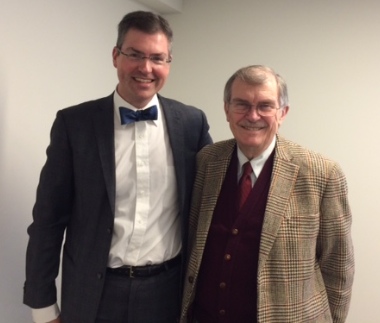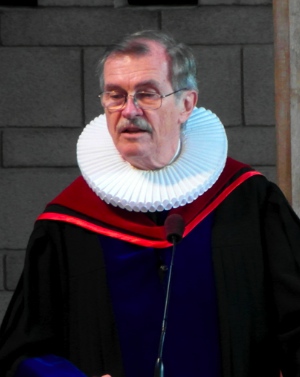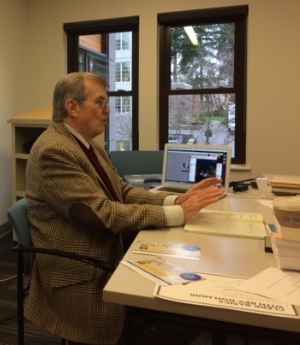
Darrell Guder (right) will be joining Ross Lockhart and the Centre for Missional Leadership throughout the year with his unique insights into the significance of the terms ‘missional’ and ‘missional church.’
If Darrell Guder didn’t invent the terms ‘missional’ and ‘missional church,’ he was certainly there when the terms were coined.
In 1998, he edited Missional Church, which introduced the terms to the North American church. Now they are omnipresent, claimed in various ways and in varying degrees by most parts of the church.
Thus Vancouverites are fortunate to have the retired Henry Winters Luce Professor of Missional and Ecumenical Theology at Princeton Theological Seminary in our midst, to clarify what is missional and what is not.
Guder has been appointed Senior Fellow in Residence for the new Centre for Missional Leadership, which is a new initiative at St. Andrew’s Hall, a Presbyterian College affiliated with Vancouver School of Theology (VST) on the UBC campus.
The Centre “will be a place for equipping leaders in worshipping communities that help form missionary disciples who can bless and mend God’s world.”
Ross Lockhart, director of the Centre, says “Darrell is helping us put some ‘flesh on the bones’ of the new Centre for Missional Leadership as we seek to equip pastors and elders for the building of vibrant, witnessing communities.”
He says Guder will be at the Centre three times a year, for three weeks each time, in January/February (he will be flying off to Korea to lecture at the end of this week), May and September.
During this visit Guder met with local pastors to discuss missional theology, lectured at Regent College and led a day retreat for 40 ruling elders from local Presbyterian congregations.

Darrell Guder delivered the sermon for the inauguration of VST’s principal in 2013. Photo by Shannon Lythgoe.
Guder delivered the sermon when Richard Topping was installed as principal of VST in the fall of 2013, reminding the assembly that “the church does not exist for its members,” and that the key mandate of schools of theology should be “upbuilding for sending.”
*************************
Following is a portion of a skype interview Guder did with Scott Hagley as part of the October 2014 Missional Voice, which published by Forge Canada, an initiative based in Metro Vancouver. It is re-posted by permission.
Missional Voice: Describe your involvement in the early days of the Gospel and Our Culture Network (GOCN) and the project that led to the book Missional Church. What questions and concerns led you into this work?
Darrell Guder: I got involved with the Gospel and Our Culture Network . . . in the fall of 1991. [At that time] it was a very loose network meeting once a year in Chicago . . . We had an opportunity to do some research as a part of a grant, and I coordinated the project that became the book Missional Church.
The project was based upon the shared consensus that we were living through the end of Christendom in the West . . . and yet we were still living as though Christendom were intact. This was very much [Lesslie] Newbigin’s challenge to the Western churches when he returned from the Indian mission field in the 1970s.
So the question we were asking ourselves was: What kind of biblical and theological work do we need to do in order to become a truly missionary church in the West? The project was not to come up with an answer, but to formulate the theological issues that we needed to address . . .
We chose the term “missional” to talk about the missionary nature of the church, that mission is not a program of the church but rather the essence, purpose, action and character of the church all wrapped up in this larger understanding of God as a missionary God. God is engaged in the mission of redeeming all of creation. . . .
MV: Now that “missional” is so popular, what developments in the conversation do you welcome? Which ones do you see as promising? Which ones give you hope?
DG: I always say that the term “missional” became a cliché with the speed of summer lightning. There is no end of problematic usages of the term. I do not know what a conversation partner means when he or she says “missional” without some discussion and clarification.
We have wondered here at Princeton if we should give up the term, but we decided [that] we are going to keep it and set a standard regarding what we mean by the term. But that is over and against this banality of the term, which is endemic.
However, I am encouraged. First . . . because there are so many conversation partners that are doing serious theological work, engaging Newbigin, responding critically to what we have written . . . I’m encouraged by my students, many of whom catch this missional vision, although they struggle, as do I, with the particular challenges of translating that challenge into the particular contexts of mainline denominational settings . . .
I’m also encouraged by the rapid expansion of various experimental forms of church, which . . . move beyond the boundaries and restrictions of Christendom and try to invent our church in terms of missional vocation . . . I think some really authentic innovation is happening . . .
By the same token, I see really traditional congregations willing to ask very difficult questions of themselves, in some cases they come to the edge of the abyss and they decide that they will either change or close. And some decide that they will change. And they repent of what they have become and then see what God wants to make out of them, what new and surprising chapter God might have for them.
So I see all of that and I cannot be pessimistic. Central to the gospel is hope, and this entails expecting God to work in surprising places and in surprising ways. There are Presbyterian congregations, as surprising as that may be, where the gospel is alive and well and people are taking their missionary vocation seriously, and I find that very encouraging.
MV: In tracking different threads of the missional conversation, what elements have you been dissatisfied with? What wrong turns have been taken?
DG: I don’t know if I would talk about wrong turns. We expected it to be a conversation, and we were hoping to be a catalyst of a conversation. And it is the character of a conversation to experiment. And there is to be a certain number of experiments in this theological exploration that turn out to not work. This is fine. And so we go back and see what went wrong and take another direction. So in that sense, I’m relaxed about the diversity of approaches.
However, I am aware of the fact that there are always tendencies to make “missional” into a marketable product. The way the consumerist approach takes over is a little bit appalling. So whenever I see missional reduced to “add water and stir, eight steps to a missional congregation,” I become discouraged . . .
I tell my students that the place in which we find ourselves and the state of Christendom is perhaps best described as a compost heap. It is really kind of messy, and smelly, and not nice looking. Many things are falling apart and institutions failing. A lot of churches are closing their doors.
But, compost heaps are incredibly generative. And God is at work precisely in old Christendom, and a new thing is about to happen. And that is a good thing, and I’m excited about the students I’ve been working with, seeing what they have been doing and where they are about to go.
MV: This “compost heap,” what would be some of the new things that you see emerging? Where are the growing edges?
DG: I think one of these is that the church must be an institution. It cannot function in the world unless it is. But how it is an institution is the form of its faithful witness. And so our task is to study and to interrogate the Christendom legacy and ask ourselves, “Where have we allowed the institution and its maintenance to become an idol?”
Where has the institution taken over and rewritten the gospel, where have we been taken captive in a way that forecloses on our missional faithfulness? That is a task we have begun to work on, but there is a great deal more to do.
Another big question is [how leaders deal with] buildings. The building presents itself as a problem. For 300 years of our history, we didn’t have buildings for the church, there’s nothing in the New Testament about buildings. And now buildings are an extremely powerful part of our history and our captivity to Christendom.
So – how do we become building users and building owners who are not so controlled by our buildings so that our missional vocation itself gets betrayed? These are very real challenges.
Another challenge is how do we in the western church engage with forms of Christianity beyond the boundaries of western culture who now challenge us with our Christendom compromises? We still have most of the money in the world, even though we have fewer and fewer people. So how do we share that wealth in missionally relevant ways with the church in other cultures?
We have to reclaim or rediscover a form of global missions that looks more like a partnership in the service of the gospel which transforms us as well as our partners.
MV: One of the things we are concerned with here is helping congregations recognize place and neighbourhood. Thinking of your own neighbourhood or congregation, if you had a million dollars to spend for the sake of mission, what would you do?
DG: That is a difficult question to answer because it’s certainly not the presupposition of mission in the New Testament. They didn’t go about mission because they had funding. In fact, they solved their funding problems by sharing what they had. They obviously didn’t have a lot.
But I want to underline the centrality of neighbour and neighbourhood. There is a consensus among missional theologians that the fundamental instrument of God’s mission is the gathered community in a concrete place, the local congregation.
This is a conviction that is also shared in Vatican II, that God’s mission happens in real people and real places. And there is a rediscovery of the value of neighbour and neighbourhood in the New Testament. This is very strong, particularly in the synoptic gospels.
What this means is that our vocation, our calling, our sending is to the people we have to deal with anyway. That is what neighbour means – the “next one” – the person I have to deal with.
And so congregations in North America, where their members are driving past difficult neighbourhoods to attend a church building, have a profound problem because they are ignoring the neighbour. It is like those two other religious leaders in the parable of the Good Samaritan where they are going out of their way to avoid their neighbour.
And that is a profound missional challenge.
For the full Missional Voice interview go here.

